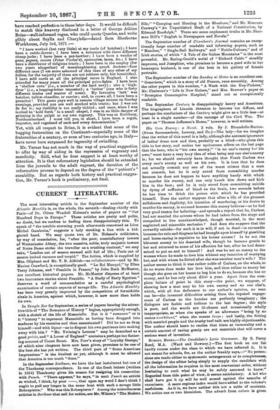His Own Enemy : a Novel. 2 vols. By J.
Bloundelle-Burton. (Swan Sonnensohein, Lowrey, and Co.)—The lady—for we imagine that the writer of this novel is a lady, although she assumes ignorance of ladies' dress now and then, probably as a blind—who gives this title to her story, and makes her spokesman affirm on the last page that the hero, who is "his own enemy," "is no one's enemy but his own," most have a very hazy idea of what being any one else's enemy is ; for we should certainly have thought that Frank Carless was every one's enemy as well as his own. it is true that he does not actually commit any one of the worst crimes that a man can commit, but he is only saved from committing murder because be does not happen to have anything handy with which to warder his enemy, and can only knock him down and kick him in the face; and he is only saved from committing suicide by dying of suffusion of blood on the brain, two seconds before he has time to drink the poison with which he has provided himself. Does the author suppose that after a life of the grossest selfishness and duplicity, his intention of murdering, or his desire to murder his enemy, is excused because this enemy believes—as he had very good reason for believing—and spreads a report that he, Carless bad not married the actress whom he had taken from the etage and compelled to live unacknowledged, though married, in the most neglected and miserable seclnaion P And does she suppose that the cowardly suicide—for such it is in will, if not in deed—is escapable because the ruin and disgrace he had brought upon himself by gambling and horse-raping is repulsive to his better nature ? Is he not the bitterest enemy to his deserted wife, though he became gentle to her and returned to some of his affection for her, after he had deter- mined to put an end to himself ? And was he not an enemy to the woman whom he made to lore him without any intention of marrying her, and with whom he flirted after she was another man's wife ? The author seems to think it was rather noble of Carless, on the whole, to do no worse than make her love him, and then refuse to marry her though she goes on her knees to beg him to do so, because she has no money, and he has only about £500 a year. Apart from the com- plete failure of point in this story—the point, we suppose, of showing how a man may be his own enemy and no one else's, which, with all due deference to our author's opinion, no man can be—the invented difficulties arising from the reputed engage. ment of Carless to the heroine are perfectly imaginary ; the dialogues are feeble and tedious to the last degree; the style is poor, and the words are ill-chosen and occasionally wholly inappropriate, as when she speaks of an allowance " being by no means exorbitant," when she means large; and lastly, the flirting with married people and the trashy turf-talk are highly objectionable. The author should learn to realise that hints at immorality and a certain amount of racing gossip are not materials that will cover a serious want of invention.


































 Previous page
Previous page